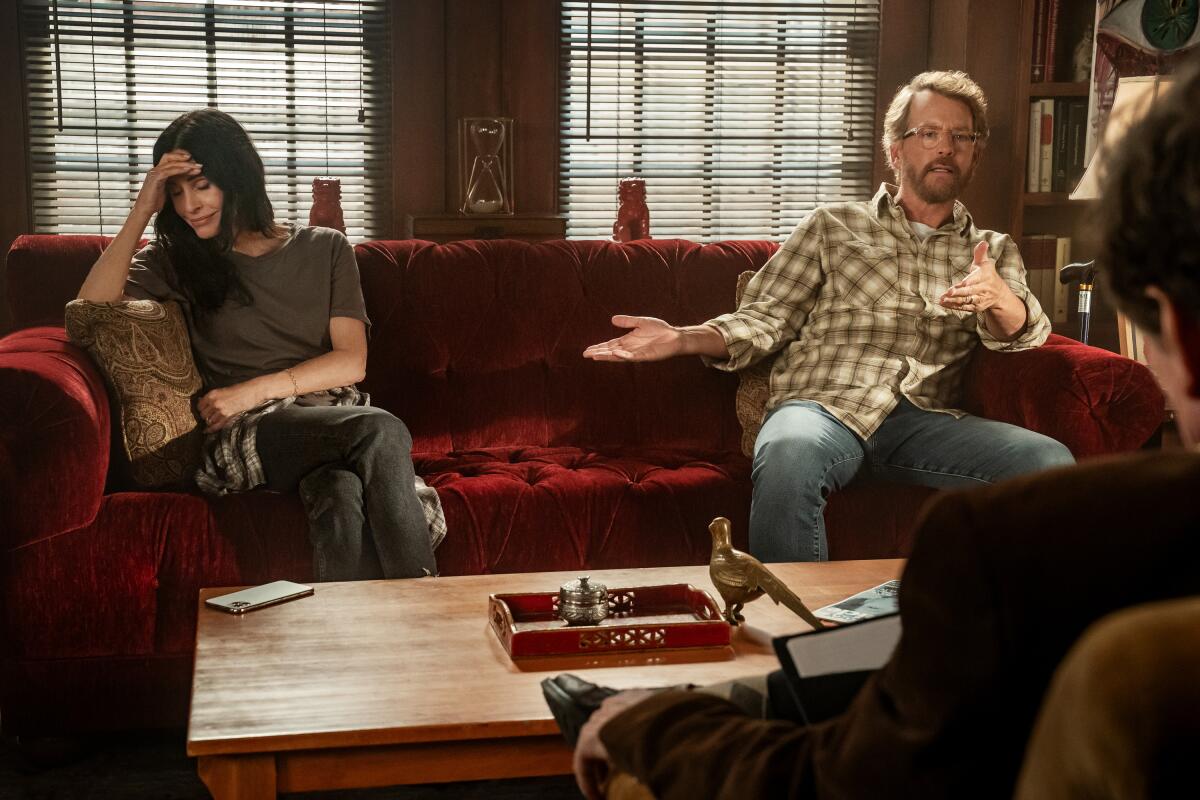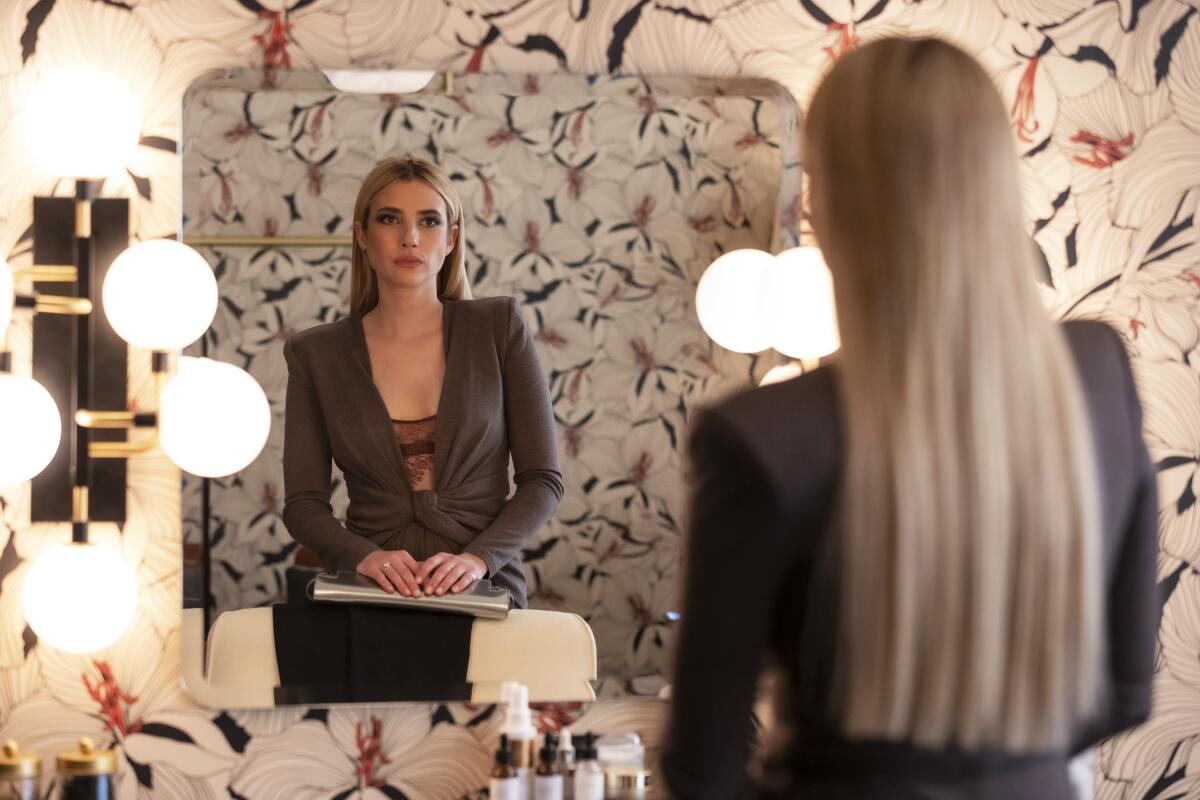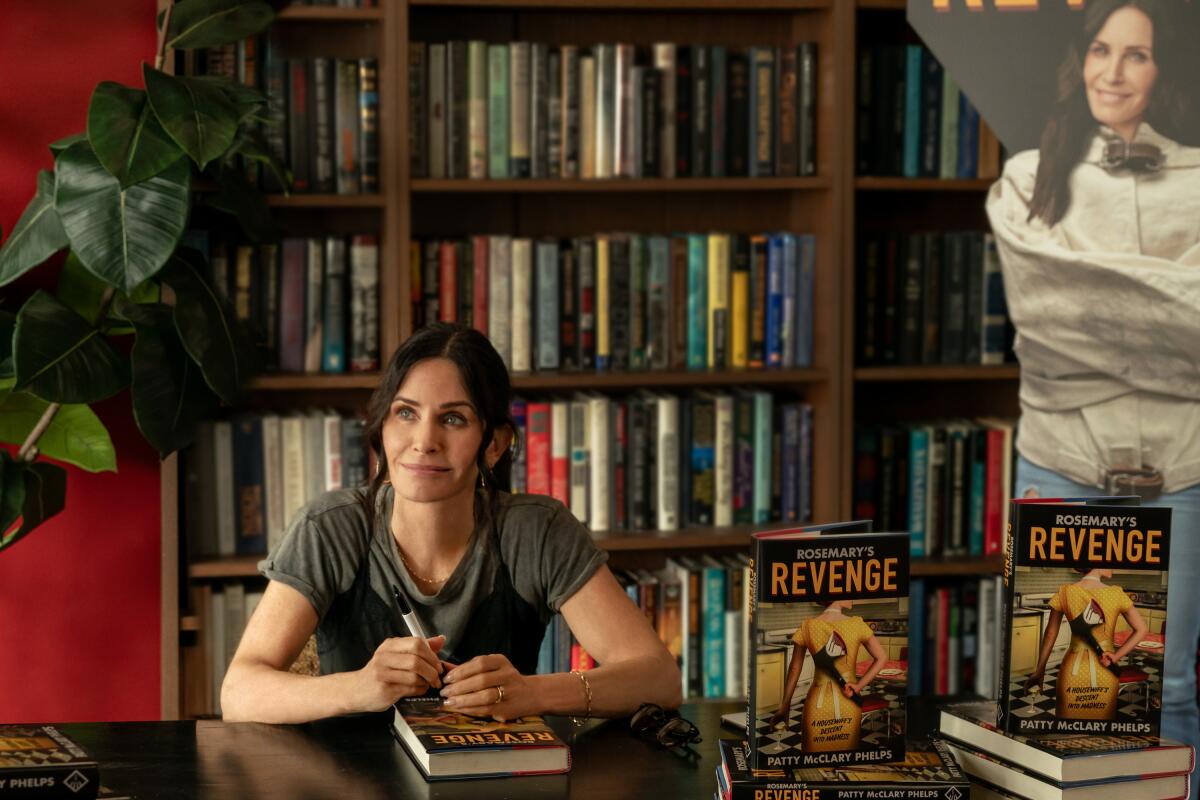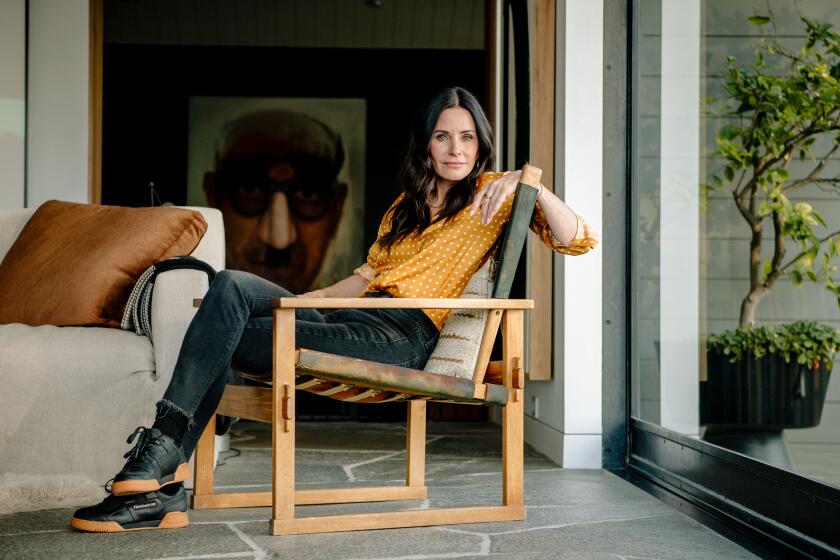Like ‘Rosemary’s Baby,’ ‘Shining Vale’ and ‘Delicate’ meditate on the horrors faced by women

- Share via
Gaslighting. Drugging. Lack of consent. Body autonomy. Fertility. Fervent religious views. Patriarchy.
Ira Levin’s 1967 psychological horror novel “Rosemary’s Baby,” which centers on a pretty young New Yorker whose husband offers her womb up to incubate the devil’s spawn in exchange for advancement in his acting career, was adapted a year later as a film that starred Mia Farrow in one of her most memorable roles.
Decades later, the themes in “Rosemary’s Baby” could not be more current — and some in Hollywood have noticed. A miniseries adaptation was released in 2014 (Zoe Saldaña starred), but more recently, its influence has been evident in several new series.
The second season of the Starz horror-comedy “Shining Vale,” which stars Courteney Cox and Greg Kinnear, is an homage to this story all the way down to its laced chocolate mousse aphrodisiac (this shouldn’t be a huge surprise to fans; Mira Sorvino’s demon that possesses Cox’s Pat in the first season is named Rosemary).
More than 25 years after ‘Friends’ and ‘Scream’ made her a household name, Cox opens up about pursuing — and landing — her most personal role to date.
“American Horror Story: Delicate,” the latest chapter of FX’s horror anthology series, uses Danielle Valentine’s pregnancy-themed novel “Delicate Condition” as its source material. The book has been compared to a modern-day “Rosemary’s Baby” (author Andrea Bartz references it in a blurb praising the novel), and Valentine told Entertainment Weekly that she’s honored by the comparison. However, she said her inspiration came from the James Cameron movie “Alien.”
“It’s a novel exploring not just the actual physical gruesomeness of what pregnancy is but also the medical gaslighting that even modern, very privileged women experience as they’re going through their pregnancies and the symptoms that I feel we as a culture still don’t talk about for strange reasons,” she said in the interview.

“Delicate” stars Emma Roberts as an actor struggling through IVF who is told by her dodgy husband (Matt Czuchry) that all the witchy weirdness suddenly happening around her is just hallucinations. FX Networks declined to make Halley Feiffer, the showrunner for “Delicate,” or others involved with the franchise available for this article, so it’s hard to say for certain whether she and the other producers had “Rosemary’s Baby” in mind when creating the series, but the parallels are evident.
Next year, Paramount is slated to release “Apartment 7A,” which is reported to be a prequel film to “Rosemary’s Baby” and uses the Levin novel as its source material. Directed and co-written by Natalie Erika James, it centers on a dancer who rents a room from an elderly couple. Julia Garner and Dianne Wiest are signed to star.
Still, other projects may conjure comparisons to the story of Rosemary Woodhouse and her husband, Guy, a man who is easily duped into a Faustian bargain thanks to his single-mindedness and inferiority complex. The Showtime series “The Curse,” which premieres Nov. 12, uses the logline that it’s a “genre-bending series that explores how an alleged curse disturbs the relationship of a newly married couple as they try to conceive a child while co-starring in their new home-improvement show,” although it’s actually about so much more. (Creators Benny Safdie and Nathan Fielder, who star in the series with Emma Stone, declined to comment for this story because of the ongoing strike by members of the Screen Actors Guild-American Federation of Television and Radio Artists).
“The thing I liked about ‘Rosemary’s Baby’ is the issues it dealt with,” says Jeff Astrof, who co-created “Shining Vale” with Sharon Horgan and serves as its showrunner. He adds that “it’s a story of a woman being duped in the same way that one of the themes of our show is that it’s men telling women how they feel and not understanding their bodies.”
He says a female director once told him that “women are drawn to horror because of their bodies. A lot of men see women’s bodies as horror because of the blood and everything like that and because the hormone changes, even though it’s a very natural thing.”

A “Rosemary’s Baby”-like storyline also fit within the narratives of this show, which is a parable about society’s frequent unwillingness to discuss women’s health and which used its first season, inspired by “The Shining,” as a way to have a conversation about menopausal schizophrenia.
“I come from a long line of women with mental health issues,” Astrof says. “It’s familiar for me and what that does to the children and what that does to the family. While it’s not universal, I think everybody can kind of relate.”
That these products are largely horror-comedy hybrids should be seen as praises and not condemnations or mockery of the source material, says Barbara Creed, a professor of cinema studies at the University of Melbourne in Australia, who specializes in feminist film theory as well as the genre of horror.
In an email, Creed writes that these modern takes are “sign[s] of respect” and that the book and film version of “Rosemary’s Baby” should be seen as compendiums to the film and TV series adaptations of author Margaret Atwood’s “The Handmaid’s Tale” and other stories “that focus on women’s reproductive rights [but that] treat their subject matter with deadly seriousness.”
“The horror genre does allow for greater freedom to present social justice issues,” Creed adds. She says she argues in her recently completed “Return of the Monstrous-Feminine: Feminist New Wave Cinema,” a follow-up to her 1993 film resource tome, “that in the new millennium, more women than ever before are directing horror films, which are strongly inter-generic, in order to address social justice issues such as male violence, rape, racism and environmental degradation: the horrors of the everyday.”
And although the film “Rosemary’s Baby” was not loudly or unanimously endorsed by the feminist movement when it was released — Creed says that “serious feminist film theory and criticism did not commence until the early to mid-’70s” and that, much like Rosemary’s own attempts for validation, until the mid-’80s, “feminist critics tended to ignore the horror film, which was viewed as a male genre in which woman was always the victim” — it eventually became a linchpin for discussion.
“The parts that have been appropriated … have dwelled more on these deeper structural issues of how patriarchy persists even in moments where it seems like women are becoming more liberated,” says Johanna Isaacson, an English professor at Modesto Junior College and the author of “Stepford Daughters: Weapons for Feminists in Contemporary Horror,” which examines the parallels of class horror and gender horror. “Why it’s so popular now is that Rosemary’s not an old-fashioned housewife who hasn’t taken in any of the ’60s.”
Isaacson points out that this heroine — as portrayed by Farrow with her iconic pixie cut, chic short dresses and baby doll nightgown — is “somebody who, I think, could be considered a new woman and has some of the rhetoric of liberation.”
“And yet, she’s still completely in thrall to the patriarchy and completely subdued by this conspiracy of men to control her body,” Isaacson adds.
Of course, a lot of the reasons why “Rosemary’s Baby” resonates now is because these same issues are still prevalent. The U.S. Supreme Court overturned Roe vs. Wade in 2022, ending the constitutional right to an abortion. And, while the #MeToo movement may have hit a fever pitch in 2017, the Pew Research Center reported in 2022 that it’s still common for survivors of sexual harassment or assault to not report it. In December, it will be 100 years since the first version of the Equal Rights Amendment was introduced to Congress.
And, most likely, all of this happened without anyone having to eat laced chocolate mousse.
More to Read
The complete guide to home viewing
Get Screen Gab for everything about the TV shows and streaming movies everyone’s talking about.
You may occasionally receive promotional content from the Los Angeles Times.







